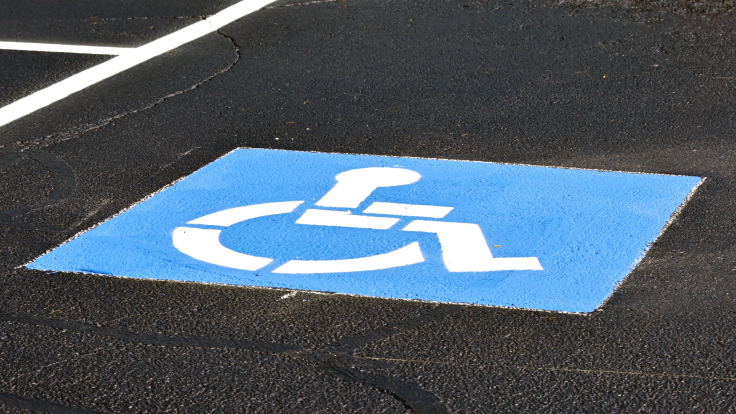The Unseen Crisis in Blue Badge Parking: A Personal Perspective from Access Earth CEO
Why accessible parking remains a daily struggle—and how technology, data, and empathy can drive real change

Accessible parking is a basic enabler of independence, participation, and safety. However, the infrastructure that underpins this necessity usually falls short. For instance, the misuse of Blue Badge bays, inadequate data on available spaces, and a general lack of investment in accessible design are common issues. These add to daily frustration and, worse, lost opportunities, missed appointments, and the constant mental toll of feeling unwelcome in public life.
Essentially, while the physical barriers are obvious, the emotional and financial burdens often go unseen. 'For most drivers, finding a parking space is a minor inconvenience. For drivers with a disability like me, it can feel like a daily battle that quietly chips away at independence, confidence, and even personal safety,' says Matt McCann, CEO and co-founder of Access Earth.

McCann knows this battle intimately. Living with cerebral palsy, he has spent his life navigating a world that wasn't designed with people like him in mind. As a technologist, entrepreneur, and public speaker on inclusion and accessibility, McCann brings his perspective and professional expertise to the conversation. He founded Access Earth, a company that utilises technology to improve accessibility in real-world spaces and works alongside local authorities, businesses, and government agencies to change how accessibility is understood and implemented.
Besides his professional expertise, it's McCann's lived experience that amplifies his voice. As someone who uses a walking frame and drives regularly with a Blue Badge, McCann has endured almost every version of exclusion. That includes being unable to exit his car due to poorly designed bays and arriving at destinations only to find spaces occupied by non-disabled drivers. He intends to share these experiences as evidence of a broken system that needs urgent attention and practical solutions.
Across Ireland, the UK, and Europe, the Blue Badge scheme was introduced with the promise of equitable access. However, reality tells a different story. For instance, in Ireland, 74% of people have witnessed misuse of accessible parking bays. Compounding the issue is the lack of accurate maps of accessible spaces and inconsistent enforcement. Nearly 70% of badge holders say their permit has never been inspected by any authority.
Amid this landscape, it's hardly surprising that 88% say they wouldn't approach anyone who misuses accessible bays. Whether out of fear of confrontation or being physically or verbally abused, the emotional impact is profound.
McCann acknowledges that as urban populations grow and car dependency continues, the pressure on accessible infrastructure intensifies. Blue Badge numbers are rising, but the number of properly maintained, appropriately located parking spaces hasn't kept pace. 'Local governing bodies in many towns and cities aren't even aware of how many accessible bays they have, let alone where they are or whether they are fit for purpose,' McCann says. Disabled drivers are then left to navigate an incomplete, often hostile environment.
The issue isn't only about fairness. It's also economical. McCann notes that the disabled community, including family and carers, represents significant purchasing power. When accessibility is poor, businesses lose out. 'A retail centre or entertainment venue that doesn't have accessible parking isn't just failing a few customers,' McCann states. 'It's turning away entire networks of people who might otherwise spend, participate, and engage.'
So why, in a time of rapid urban innovation and smart cities, has so little been done to address a challenge so many people experience every day? McCann believes it comes down to outdated perspectives.

'Many still frame disability through a medical lens, as a personal challenge, instead of a societal issue that needs proactive and inclusive design,' he says. 'Accessible parking is still treated as a tick-box obligation. Designate them at bays outside the church, the post office, and the clinic. But people with disabilities go to the cinema, shop in busy town centres, and meet friends at cafés just like everyone else. Planning should reflect the full spectrum of daily life, not a narrow slice of it.'
McCann's work illustrates his belief that technology can and must be part of the solution. Through Access Earth's Smart Parking Accessibility and Compliance Enhancement System (SPACES) Project, McCann introduces a threefold solution. First, SPACES aims to obtain accurate data: how many accessible parking spaces exist, where they are located, what condition they're in, and whether they meet the needs of today's vehicles and users. Utilising the power of advanced technology to complete in-depth mapping audits, the Access Earth team has developed tools to create clear, real-time maps of a community's accessible infrastructure.
Second, SPACES intends to track occupancy through ground sensors, for instance, so that drivers can know in advance whether a space is free or full. And third, enforcement must be automated and integrated. By connecting upgraded Blue Badges with smart bays, it becomes possible to detect when a space is used by someone without a valid permit and automatically alert local enforcement officers to take action.
The vision doesn't stop at Ireland's borders. McCann sees global potential in these solutions and is already in discussions with stakeholders in the UK and beyond. With major international events soon to bring millions of visitors to cities across Ireland and the UK, the time to demonstrate leadership on accessibility is now.
Ultimately, the road to real change lies in collaboration, innovation, and a shared recognition that accessibility is a fundamental human right, an economic imperative, and a driver of social equity. Partnerships with local authorities, national transport bodies, and the private sector are crucial to advance the movement of reshaping how society thinks about space, inclusion, and community. McCann states: 'We can't wait for regulation alone to fix this. We must be proactive and design for dignity, enforce with empathy, and build with intention.'
© Copyright IBTimes 2025. All rights reserved.





















